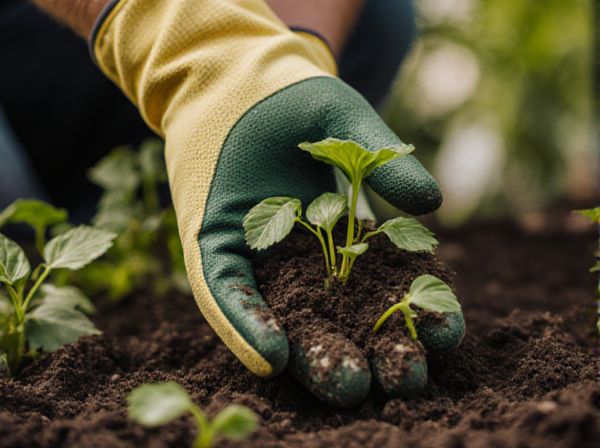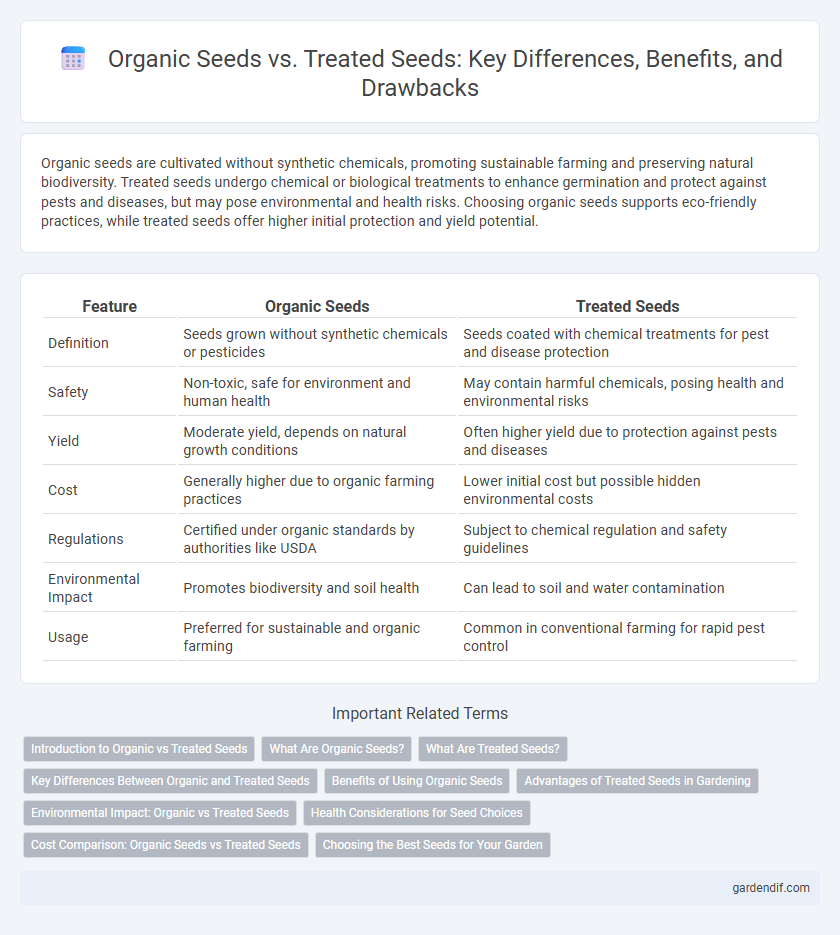
Organic seeds vs Treated seeds Illustration
Organic seeds are cultivated without synthetic chemicals, promoting sustainable farming and preserving natural biodiversity. Treated seeds undergo chemical or biological treatments to enhance germination and protect against pests and diseases, but may pose environmental and health risks. Choosing organic seeds supports eco-friendly practices, while treated seeds offer higher initial protection and yield potential.
Table of Comparison
| Feature | Organic Seeds | Treated Seeds |
|---|---|---|
| Definition | Seeds grown without synthetic chemicals or pesticides | Seeds coated with chemical treatments for pest and disease protection |
| Safety | Non-toxic, safe for environment and human health | May contain harmful chemicals, posing health and environmental risks |
| Yield | Moderate yield, depends on natural growth conditions | Often higher yield due to protection against pests and diseases |
| Cost | Generally higher due to organic farming practices | Lower initial cost but possible hidden environmental costs |
| Regulations | Certified under organic standards by authorities like USDA | Subject to chemical regulation and safety guidelines |
| Environmental Impact | Promotes biodiversity and soil health | Can lead to soil and water contamination |
| Usage | Preferred for sustainable and organic farming | Common in conventional farming for rapid pest control |
Introduction to Organic vs Treated Seeds
Organic seeds are cultivated without synthetic chemicals, preserving natural biodiversity and promoting healthier soil ecosystems. Treated seeds undergo chemical or biological treatments to protect against pests and diseases, enhancing germination rates and early plant vigor. Understanding the differences between organic and treated seeds helps farmers select appropriate options based on environmental impact, regulatory standards, and crop management goals.
What Are Organic Seeds?
Organic seeds are produced through natural farming methods without synthetic pesticides, herbicides, or chemical fertilizers, ensuring a pure and eco-friendly origin. These seeds come from plants grown in certified organic soil, promoting biodiversity and enhancing soil health over time. Unlike treated seeds, organic seeds are free from chemical coatings or treatments, making them safer for the environment and sustainable agriculture.
What Are Treated Seeds?
Treated seeds are seeds coated with chemical or biological agents to protect them from pests, diseases, and adverse environmental conditions during germination and early growth. These treatments often include fungicides, insecticides, or fungistats designed to enhance seedling vigor and improve crop establishment. Unlike organic seeds, treated seeds may contain synthetic chemicals that can affect soil health and biodiversity.
Key Differences Between Organic and Treated Seeds
Organic seeds are grown without synthetic pesticides, herbicides, or chemical fertilizers, ensuring they are free from chemical residues and support sustainable farming practices. Treated seeds undergo chemical coating processes that protect against pests and diseases but may contain fungicides, insecticides, or other synthetic agents, potentially impacting soil health and biodiversity. The key differences lie in their production methods, chemical treatments, and environmental impact, with organic seeds promoting ecosystem balance and treated seeds offering enhanced initial protection but raising concerns over long-term soil and ecological effects.
Benefits of Using Organic Seeds
Organic seeds promote healthier plant growth by avoiding synthetic chemicals, which enhances soil biodiversity and reduces environmental impact. These seeds often result in crops with higher nutritional value and better resistance to pests and diseases due to natural genetic diversity. Using organic seeds supports sustainable agriculture practices, fostering long-term ecosystem balance and improved food safety.
Advantages of Treated Seeds in Gardening
Treated seeds offer enhanced protection against soil-borne diseases and pests, increasing germination rates and promoting robust early growth in gardening. These seeds often contain fungicides or insecticides that reduce the need for additional chemical applications, resulting in healthier plants and higher yields. Gardeners benefit from the reduced risk of seedling loss and improved crop uniformity with treated seeds.
Environmental Impact: Organic vs Treated Seeds
Organic seeds promote biodiversity and soil health by avoiding synthetic chemicals, reducing pollution and minimizing harm to beneficial insects and microorganisms. Treated seeds, coated with chemical pesticides and fungicides, pose risks of contaminating soil and water sources, potentially disrupting ecosystems and contributing to resistance in pests. Choosing organic seeds supports sustainable agriculture practices that preserve environmental integrity and long-term ecosystem balance.
Health Considerations for Seed Choices
Organic seeds are free from synthetic chemicals and pesticides, reducing the risk of harmful residues in crops and promoting safer consumption for consumers. Treated seeds often contain fungicides or insecticides that can pose health risks to farmers through exposure and may contribute to environmental toxicity. Choosing organic seeds supports healthier soil microbiomes and long-term sustainability by minimizing chemical inputs in agriculture.
Cost Comparison: Organic Seeds vs Treated Seeds
Organic seeds typically have a higher upfront cost due to the labor-intensive certification process and sustainable farming practices involved. Treated seeds are generally less expensive initially, as chemical treatments reduce pest-related losses and improve germination rates, lowering overall risk and potential costs. However, the long-term benefits and market value of organic seeds often justify their premium price for eco-conscious farmers and consumers.
Choosing the Best Seeds for Your Garden
Organic seeds are untreated and free from synthetic chemicals, ensuring natural growth and health-friendly produce, while treated seeds are coated with fungicides or pesticides to protect against pests and diseases during germination. Choosing the best seeds depends on garden goals: organic seeds support sustainable ecology and chemical-free yields, whereas treated seeds offer higher germination rates and early-stage protection. Gardeners prioritizing long-term soil health and pure harvests should opt for certified organic seeds, while those seeking quick, reliable sprouting might consider treated seeds with caution.
Organic seeds vs Treated seeds Infographic

 gardendif.com
gardendif.com